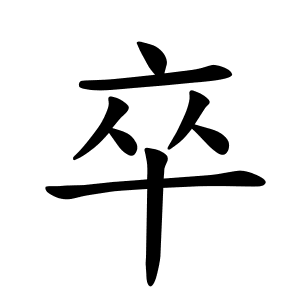卒
- to finish, to end;
- to die;
- soldier;
Etymology
Originally written 䘚, attested from oracle bone inscriptions.
衣 (옷 의) — clothing
爻 (효) — cross pattern
Together depict the patterned uniform of attendants, servants, or soldiers.
From this base sense of “soldier, servant,” the meanings “to die” and “to finish” arose — soldiers on campaign often met death, hence the association.
Usage in Korean
卒業 (졸업) — graduation, to finish studies
卒死 (졸사) — sudden death
卒記 (졸기) — obituary record in annals (record after one’s death)
士卒 (사졸) — soldiers, rank-and-file
猝卒 (졸졸) — sudden, abrupt
Additional notes
In Joseon Annals, 卒記 refers to posthumous evaluation of a person after death.
Colloquial Korean phrase: “나를 졸로 보냐?” — “Do you take me for a mere commoner (a ‘졸’)?”
Rare Sino-Korean reading 졸 is shared by only a few characters (卒, 拙, 猝).
In Japanese Shinjitai, when used as part of compounds it sometimes shifts to 卆 (e.g., 粋 → 粋, 砕 → 砕), but the standalone 卒 remains unchanged.
Words that derived from 卒
- 卜人人十 (YOOJ)
- ⿱ 𠅃 十
